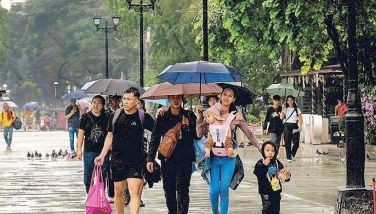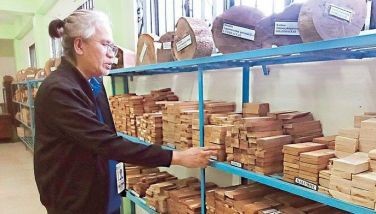Burgos, press freedom icon, 62
November 17, 2003 | 12:00am
Journalist and farmer Jose Burgos Jr., named one of the world’s "50 Press Freedom Heroes of the Century" by the International Press Institute (IPI) in 2000, died yesterday morning of a lingering ailment at the Cardinal Santos Memorial Hospital in San Juan, his family announced. He was 62.
His remains will lie at the Land Farm in San Miguel, Bulacan, where he had stayed for more than 15 years.
Burgos, the leading symbol of the "alternative press" or "mosquito press" that exposed the truth about the Marcos dictatorship with his publication WE Forum, was jailed by the late dictator Ferdinand Marcos along with his leading columnists and staff members after a raid on his newspaper office in December 1982, but went back to active publishing just a month after being released from prison.
With WE Forum’s printing plant padlocked and sedition charges still pending in court, Burgos tested the limits of press freedom by publishing the Ang Pahayagang Malaya as a national broadsheet weekly in early 1983, eventually becoming a daily newspaper shortly after the assassination of Sen. Benigno "Ninoy" Aquino Jr. on Aug. 21 of the same year. WE Forum itself resumed publication in 1985 after the Supreme Court, in a landmark decision, declared the raid illegal and overturned the government case against the Burgoses.
In a statement issued yesterday, President Arroyo condoled with the Burgos family.
"I condole with the family of Malaya founder Jose Burgos Jr., who died today. He was a pillar of Philippine journalism and a staunch freedom fighter. He devoted his entire journalistic career to an unrelenting pursuit of truth, fairness and objectivity. The country will surely miss his crusading efforts, specially in these times," the President said.
Sen. Teresa Aquino-Oreta, Ninoy’s sister, also extended her condolences to the Burgos family, saying that with Burgos’ death "Philippine journalism has lost one of its revered icons."
Burgos, she said, "was a class act unto himself, having pursued, as editor-publisher of WE Forum and Ang Pahayagang Malaya, the fight for truth, freedom, justice and democracy."
Oreta believes the 1986 EDSA Revolution would not have happened "without Joe and his... publications in the frontline. Nobody could argue the fact that the brave fight for freedom and democracy would have been a much tougher battle without Joe and his ragtag band of journalists."
Burgos started his long journalistic career as a police reporter with the Philippines Herald-dzHP in 1961. As a fearless, investigative police reporter with the Times-Mirror-Taliba chain of newspapers of Don Joaquin "Chino" Roces, Burgos was 29 when he was chosen one of the Ten Outstanding Young Men (TOYM) in 1970, for his reportage of election-related violence in Ilocos Sur, his home province. After martial law, with the Roces publications padlocked and the old man Roces thrown in jail, Burgos decided, after stints with the National Housing Authority (NHA) and the Philippine National Oil Co. (PNOC), to try his hand at publishing an independent newspaper, coming out with the WE (For the Young Filipino) in May 1977, later renaming it WE Forum.
His close interaction with opposition leaders then, including Ninoy, influenced the direction of his newspaper, eventually making it the flagship of several publications published by various groups, now collectively called the "alternative press."
In recognition of his advocacy of press freedom under martial-law conditions, the InterPress Service named him the "International Journalist of the Year" in 1986, shortly after the people power revolt. It was an award he received in rites at the United Nations headquarters in New York City.
As part of the millennium celebrations in 2000 and the IPI’s 50th anniversary, Burgos was named one of the 50 "World Press Freedom Heroes of the Century," receiving the award in special rites in Boston.
On May 10, 2000, the Philippine Senate unanimously adopted Senate Resolution No. 52 "honoring Jose G. Burgos Jr. for his heroic deeds and steadfast struggle as a journalist."
Since 1986 he has steadily ventured into organic farming
in San Miguel, Bulacan, complementing this with multi-awarded forays into science and agriculture journalism. His interest in science and the environment had been nurtured even during his days as a police reporter, especially after he became a Jefferson Fellow at the East-West Center in Hawaii, specializing in Ecology, Environment, Development and Communications.
Burgos wrote an agriculture column in the Philippine Daily Inquirer from 1992 to 1997; and an environment-focused column for the Business Star.
He was writing an agriculture column in TODAY newspaper — where he continued writing science-related articles as a special correspondent — when appointed by then President Joseph Estrada as president/publisher and editor in chief of the Journal Group of Publications. He went into consultancy work after this stint.
Burgos also developed quite a following as a broadcast anchor. His weekly radio program over dzMM, Sa Kabukiran, was adjudged the Most Outstanding Agriculture Radio Program in 1996. A few months before his death, he was anchoring a similar program with his wife on Radio Veritas. He was also deep into rice advocacy.
A Philosophy and Letters student of the University of Santo Tomas from 1958-1963, he had also been active in the past few years, organizing former UST Philets colleagues under the Philets Foundation.
Burgos Jr. is married to Edita Chavez Tronqued of Tabaco, Albay. They have five children: Peachy, Sonny, Jay, Jay-el and Ann.
His father, the late Jose Burgos Sr., was also a journalist and publisher who inspired him in independent publishing. His family, along with his brothers and sisters Rodolfo, Roberto, Elizabeth, Eduardo, Josefina, Teodoro and Ramon, request the reader to say a prayer for him and — as the late feisty journalist also insisted — a prayer as well for a country he loved so well.
His remains will lie at the Land Farm in San Miguel, Bulacan, where he had stayed for more than 15 years.
Burgos, the leading symbol of the "alternative press" or "mosquito press" that exposed the truth about the Marcos dictatorship with his publication WE Forum, was jailed by the late dictator Ferdinand Marcos along with his leading columnists and staff members after a raid on his newspaper office in December 1982, but went back to active publishing just a month after being released from prison.
With WE Forum’s printing plant padlocked and sedition charges still pending in court, Burgos tested the limits of press freedom by publishing the Ang Pahayagang Malaya as a national broadsheet weekly in early 1983, eventually becoming a daily newspaper shortly after the assassination of Sen. Benigno "Ninoy" Aquino Jr. on Aug. 21 of the same year. WE Forum itself resumed publication in 1985 after the Supreme Court, in a landmark decision, declared the raid illegal and overturned the government case against the Burgoses.
In a statement issued yesterday, President Arroyo condoled with the Burgos family.
"I condole with the family of Malaya founder Jose Burgos Jr., who died today. He was a pillar of Philippine journalism and a staunch freedom fighter. He devoted his entire journalistic career to an unrelenting pursuit of truth, fairness and objectivity. The country will surely miss his crusading efforts, specially in these times," the President said.
Sen. Teresa Aquino-Oreta, Ninoy’s sister, also extended her condolences to the Burgos family, saying that with Burgos’ death "Philippine journalism has lost one of its revered icons."
Burgos, she said, "was a class act unto himself, having pursued, as editor-publisher of WE Forum and Ang Pahayagang Malaya, the fight for truth, freedom, justice and democracy."
Oreta believes the 1986 EDSA Revolution would not have happened "without Joe and his... publications in the frontline. Nobody could argue the fact that the brave fight for freedom and democracy would have been a much tougher battle without Joe and his ragtag band of journalists."
Burgos started his long journalistic career as a police reporter with the Philippines Herald-dzHP in 1961. As a fearless, investigative police reporter with the Times-Mirror-Taliba chain of newspapers of Don Joaquin "Chino" Roces, Burgos was 29 when he was chosen one of the Ten Outstanding Young Men (TOYM) in 1970, for his reportage of election-related violence in Ilocos Sur, his home province. After martial law, with the Roces publications padlocked and the old man Roces thrown in jail, Burgos decided, after stints with the National Housing Authority (NHA) and the Philippine National Oil Co. (PNOC), to try his hand at publishing an independent newspaper, coming out with the WE (For the Young Filipino) in May 1977, later renaming it WE Forum.
His close interaction with opposition leaders then, including Ninoy, influenced the direction of his newspaper, eventually making it the flagship of several publications published by various groups, now collectively called the "alternative press."
In recognition of his advocacy of press freedom under martial-law conditions, the InterPress Service named him the "International Journalist of the Year" in 1986, shortly after the people power revolt. It was an award he received in rites at the United Nations headquarters in New York City.
As part of the millennium celebrations in 2000 and the IPI’s 50th anniversary, Burgos was named one of the 50 "World Press Freedom Heroes of the Century," receiving the award in special rites in Boston.
On May 10, 2000, the Philippine Senate unanimously adopted Senate Resolution No. 52 "honoring Jose G. Burgos Jr. for his heroic deeds and steadfast struggle as a journalist."
Since 1986 he has steadily ventured into organic farming
in San Miguel, Bulacan, complementing this with multi-awarded forays into science and agriculture journalism. His interest in science and the environment had been nurtured even during his days as a police reporter, especially after he became a Jefferson Fellow at the East-West Center in Hawaii, specializing in Ecology, Environment, Development and Communications.
Burgos wrote an agriculture column in the Philippine Daily Inquirer from 1992 to 1997; and an environment-focused column for the Business Star.
He was writing an agriculture column in TODAY newspaper — where he continued writing science-related articles as a special correspondent — when appointed by then President Joseph Estrada as president/publisher and editor in chief of the Journal Group of Publications. He went into consultancy work after this stint.
Burgos also developed quite a following as a broadcast anchor. His weekly radio program over dzMM, Sa Kabukiran, was adjudged the Most Outstanding Agriculture Radio Program in 1996. A few months before his death, he was anchoring a similar program with his wife on Radio Veritas. He was also deep into rice advocacy.
A Philosophy and Letters student of the University of Santo Tomas from 1958-1963, he had also been active in the past few years, organizing former UST Philets colleagues under the Philets Foundation.
Burgos Jr. is married to Edita Chavez Tronqued of Tabaco, Albay. They have five children: Peachy, Sonny, Jay, Jay-el and Ann.
His father, the late Jose Burgos Sr., was also a journalist and publisher who inspired him in independent publishing. His family, along with his brothers and sisters Rodolfo, Roberto, Elizabeth, Eduardo, Josefina, Teodoro and Ramon, request the reader to say a prayer for him and — as the late feisty journalist also insisted — a prayer as well for a country he loved so well.
BrandSpace Articles
<
>
- Latest
- Trending
Trending
Latest
Trending
Latest
Recommended



























